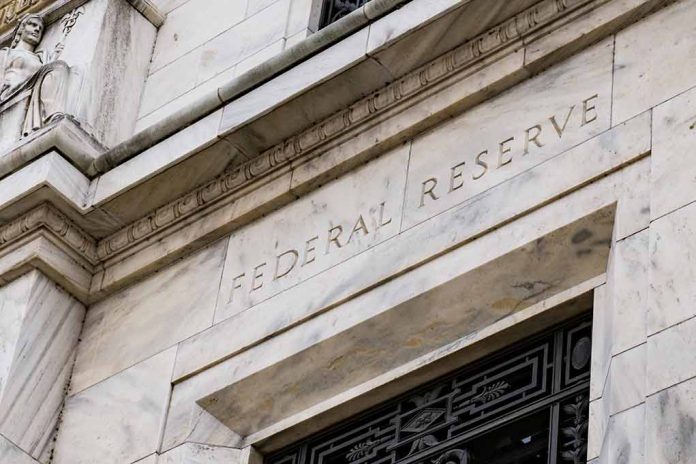
Federal Reserve Chairman Jerome Powell stands firm against potential pressure from President-elect Donald Trump, asserting the independence of the central bank.
At a Glance
- Powell states he would not resign if asked by Trump.
- Trump previously criticized Powell for raising interest rates.
- Powell emphasizes Fed’s independence from political influence.
- Economists stress importance of Fed’s autonomy.
- Powell asserts elections won’t impact Fed’s policy decisions.
Powell’s Stance on Fed Independence
Federal Reserve Chairman Jerome Powell has taken a strong stance on the independence of the central bank, responding with a firm “No” when asked if he would step down at the request of President-elect Donald Trump. This resolute position comes in the wake of Trump’s victory and amid concerns about potential political pressure on the Fed’s monetary policy decisions.
Powell, who was appointed by Trump in 2018, has faced criticism from the former president for raising interest rates, which Trump argued harmed the economy. Despite this history of tension, Powell has reaffirmed his commitment to the Fed’s autonomy, emphasizing that the incoming president does not have the authority to fire him or other senior Federal Reserve leaders.
If Trump asks Jerome Powell to leave the Federal Reserve, should he?
Technically, the President can request the Fed Chair’s resignation, but let’s get real about what this means for economic stability and governance. Jerome Powell’s role is designed to be independent from… pic.twitter.com/hhhyJ0NXpY
— Ken Rutkowski (@kenradio) November 8, 2024
Trump’s Criticism and Fed’s Response
The relationship between Trump and Powell has been strained since Powell’s appointment. Trump accused Powell of damaging the economy through interest rate hikes, which the Fed implemented to prevent inflation. In response to economic pressures, the Fed has since made rate cuts, including a quarter-point reduction following a previous half-percent cut in September.
Trump’s desire for more presidential influence over interest rate decisions has raised concerns among economists who stress the importance of the Fed’s independence. This sentiment was echoed by Powell, who stated that elections would not sway the Fed’s policy decisions in the near term.
Importance of Fed’s Independence
Economists and financial experts have consistently emphasized the critical nature of the Federal Reserve’s autonomy. The ability to make monetary policy decisions without political interference is seen as crucial for maintaining economic stability and preventing short-term political interests from distorting long-term economic planning.
“The independence of the Fed is something that not just economists, or investors, but citizens should place a high value on” – economist Carl Tannenbaum
Powell’s firm stance on not resigning, even if asked by the president, underscores the legal protections in place to safeguard the Fed’s independence. This position is not new for Powell, who gave a similar response when asked about potential resignation requests from Trump in 2019.
Looking Ahead
As the political landscape shifts with the recent election results, the Federal Reserve’s role and its relationship with the executive branch remain under scrutiny. Powell’s assertion that “In the near term, the election will have no effects on our policy decisions” reaffirms the Fed’s commitment to maintaining its course based on economic data rather than political pressures.
The ongoing debate over the Federal Reserve’s independence highlights the delicate balance between monetary policy and political influence in the United States. As the economy faces new challenges, the resolve of Powell and the Fed to maintain their autonomy will likely continue to be a point of discussion and potential contention in the coming months.
Sources:
- Federal Reserve Chairman Jerome Powell says he will not resign if asked by Trump
- What Trump’s Win Means for Fed Independence
- Powell Signals Readiness to Defy Trump in Defense of Fed
- Forget a Soft Landing. The Fed’s Biggest Challenge May Be Trump.



